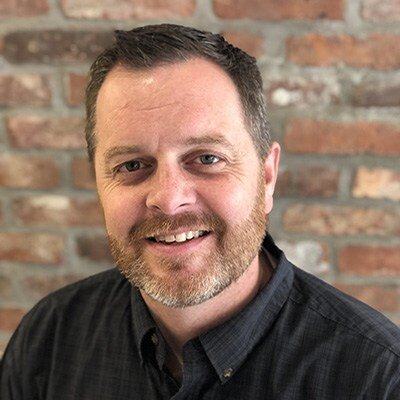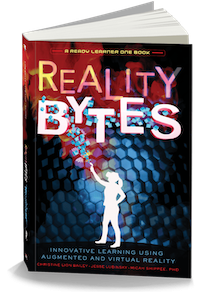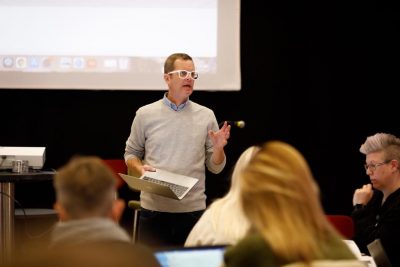 Micah Shippee G’16 earned his Ph.D. in Instructional Design, Development and Evaluation (IDDE) and is now an adjunct professor in the Syracuse University School of Education. In 2021-2022, he is teaching three courses: Principles of Instruction and Learning, Strategies in Educational Project Management, and Planned Change and Innovation. Shippee also is the CEO of Ready Learner One LLC and a middle school social studies teacher in Liverpool, NY.
Micah Shippee G’16 earned his Ph.D. in Instructional Design, Development and Evaluation (IDDE) and is now an adjunct professor in the Syracuse University School of Education. In 2021-2022, he is teaching three courses: Principles of Instruction and Learning, Strategies in Educational Project Management, and Planned Change and Innovation. Shippee also is the CEO of Ready Learner One LLC and a middle school social studies teacher in Liverpool, NY.
Current IDDE doctoral student Yuri Pavlov recently interviewed Shippee about his experience in the doctoral program and how it has influenced his educational and learning technology innovations.
What pulled you into instructional design?
As I was reconsidering my career goals in 2005, I contacted [now Professor Emeritus] Phil Doughty in the IDDE department. He shared stories of successes, international connections, and the ability to leverage “instructional design superpowers” on a global level. I was excited, and he sold me on the department. The existing C.A.S. program at the time was a good fit for me. Then in 2007, I continued with the doctoral program.
How did the years in IDDE change you?
The understanding of why things work. As a teacher, you intuitively recognize when students are engaged—which activity or style of instruction works. When one understands the “why,” it helps replicate and scale up one’s work. For instance, when I taught my classes, I used simulations in the classroom to foster empathetic understanding of our historical content. These led to deeper, more meaningful conversations about the human experience in the past and how it related to the present.
“[At the School of Education] we’re not just thinking about our thinking or participating in some metacognitive exercises. We’re doing. I want people to be excited about what our program can prepare them to do.”
Were there any courses or themes in your doctoral program that helped you grow the most?
Three courses stood out: Motivation in Learning and Instruction (with Prof. Rob S. Pusch) had the most impact on my practice. Planned Change and Innovation (with Prof. Chuck Spuches) influenced my research. Instructional Design and Emerging Technologies (with Prof. Tiffany Koszalka) was central to my dissertation and current work.
Before IDDE, I had not taken anything on [Albert] Bandura or motivational design; I even had not heard about Ruben Puetendura’s SAMR model. These things are very relevant for a teacher, but I only learned them as a postgraduate student in the School of Education’s program.
 What happened after you finished your doctorate?
What happened after you finished your doctorate?
The year before I finished, I connected with a professional development agency that trained teachers across the world on improving practice in the classroom using Google and Apple products. After completing my studies, I worked as a consultant and keynote speaker, delivering inspiring messages about why we teach, how we improve our classroom-based practice, or how a certain tool works.
In 2019, several colleagues and I were working on a book we were planning to call Ready Learner One. In the middle of the writing process, we decided that was a better name for a company, so we changed the name of a book to Reality Bytes (Dave Burgess Consulting, 2020) and the company became Ready Learner One. Initially, we were focused on augmented and virtual reality professional development for schools. With the COVID-19 pandemic, the company focus pivoted to supporting educators in a hybrid model.
Before starting the company, I worked with Google Earth and became a lead Google Earth Educational Expert for the East Coast. In this role, I worked both with my own students and students around the planet, including in Yellowknife Northwest Territory in Canada. We used Google Earth tools in a collaborative digital storytelling project for a global audience to create a narrative focused on understanding our local community needs using maps and media.
What kind of projects does Ready Learner One do?
![]() Ready Learner One, in effect, is a holding company in the learning and design space. It has a K-12 educational consulting company called ChangeMaker; a corporate consulting agency focusing on instructional design; and an RL1 corporate course company, where people can take courses for continuing education credit. In both the corporate and education sides, we build self-paced courses with Rise Articulate—right now we have over a hundred of them on our education platform.
Ready Learner One, in effect, is a holding company in the learning and design space. It has a K-12 educational consulting company called ChangeMaker; a corporate consulting agency focusing on instructional design; and an RL1 corporate course company, where people can take courses for continuing education credit. In both the corporate and education sides, we build self-paced courses with Rise Articulate—right now we have over a hundred of them on our education platform.
 You returned to Syracuse University to teach in 2020. What brought you back?
You returned to Syracuse University to teach in 2020. What brought you back?
Teachers want to teach. Being back at Syracuse University is like coming home—it’s the place where I learned a lot of the skills I apply in my work. I think it’s very important that I share as an example of what can be done with this degree.
The beauty of Syracuse’s IDDE program is that while there are heavy theoretical foundations, there are also tangible applications that inform practice. We’re not just thinking about our thinking or participating in some metacognitive exercises. We’re doing. I want people to be excited about what our program can prepare them to do.
In terms of learning, what is the added value of virtual reality to instructional design?
Virtual reality amplifies instruction by increasing experiential knowledge. If we could put students in a chemistry lab and have them mix chemicals that blow up, they will learn about explosive combinations better than an instructor simply telling them: “Don’t mix those two chemicals together in a live lab.” The barrier to entry is expensive but, like Moore’s Law teaches us, costs are going down.
I have a friend who designed a VR experience to demonstrate how to load a tank with fuel and not spill it for a large oil company. It cost him $350,000 to develop, while a single oil spill costs the company $35,000. The return on investment is easy to sell when you frame it like that.
Going forward, what do you want to be known for among students and scholars-practitioners?
I want to be known as someone who thinks about what is next in learning; as a futurist in the instructional design space; and as someone constantly pushing the envelope of learning technologies, with solid foundations of theoretical frameworks at my back.
Learn more about School of Education doctoral programs and certificates of advanced study, including instructional design programs.
